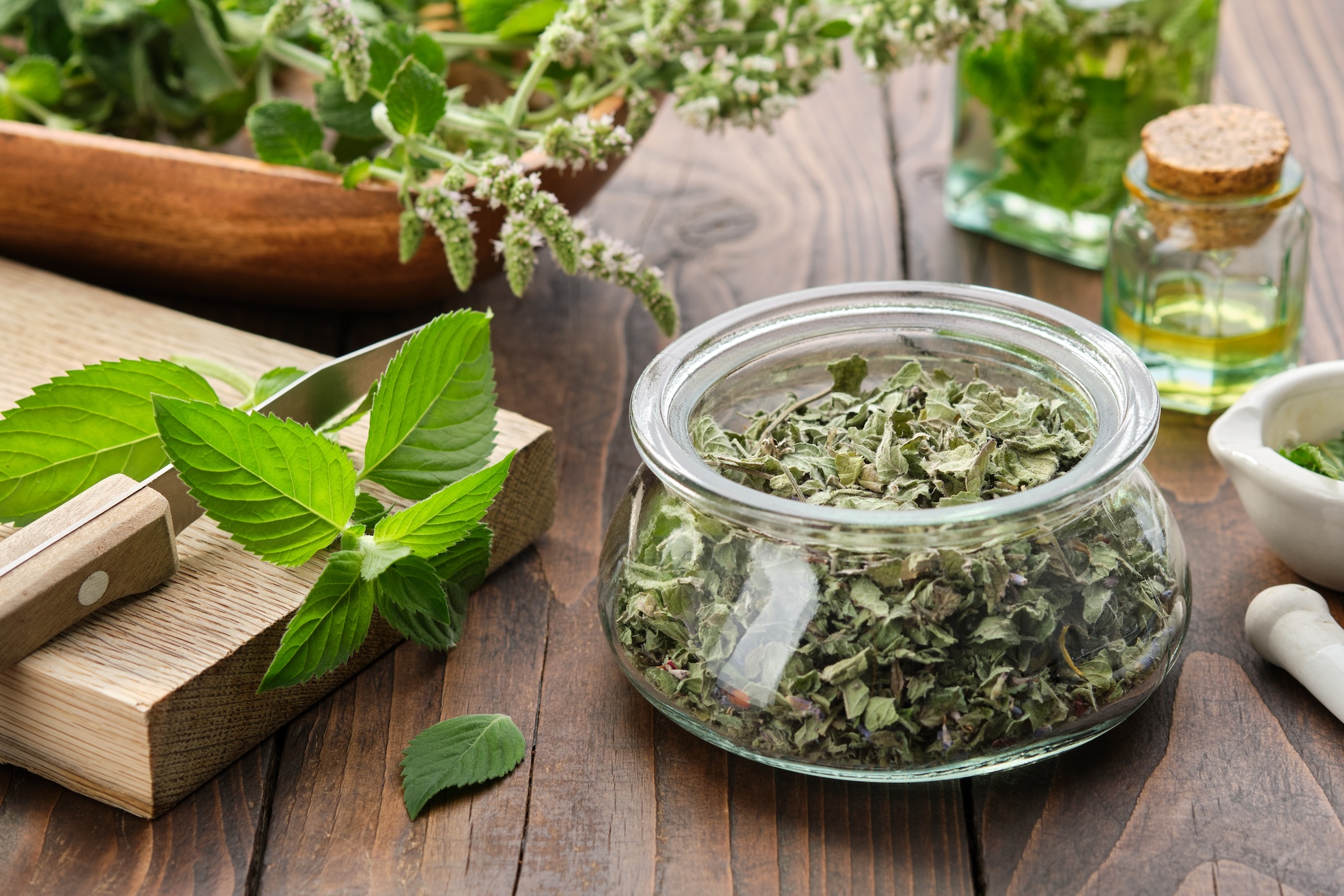Krystle Bouck was pleased with her results from drinking bugleweed tea—recommended by herbalist friends when she was diagnosed with an autoimmune disease three years ago, a thyroid condition called Graves’ disease.
The tea seemed to be rebalancing her thyroid hormones and helped resolve anxiety and sleeplessness. However, the tea wasn’t tasty at all. It was extremely bitter—and she still had bloating and stomach distress.
“One day, when I was having a particularly difficult time, I went for a walk in my backyard, and there was a huge patch of peppermint growing there. I picked some and added it to my tea and it not only made the bitter tea taste better, it helped with the stomach discomfort,” Bouck told The Epoch Times. “That unexpected blessing meant so much to me. It felt like God had seen me in my struggle and put it there just for me.”
Peppermint can have a soothing effect on symptoms such as bloating, stomach cramping, indigestion, and gas caused by temporary stomach troubles or chronic conditions. It can be enjoyed in a variety of ways and is generally safe for most people. Depending on how and when you use it, peppermint can even prevent digestive problems.
A Familiar Flavor
When we think of peppermint, it usually brings to mind the distinct cool, refreshing flavor associated with cleanliness and candy. It’s added to toothpastes, mouthwashes, and breath mints. Peppermint gives our mouths a fresh feeling and has potent properties for oral health. It has
antimicrobial, antioxidant, and anti-inflammatory properties.
Peppermint’s cooling sensation comes from menthol, a component of the herb that is also anti-inflammatory and analgesic. That is, menthol suppresses inflammatory molecules and numbs pain receptors, which is beneficial for irritation along the entire gastrointestinal tract.
Because peppermint is such a familiar flavor, Naomi Kilbreth, clinical herbalist with Laurel Tree Wellness, likes to pair it with bitter herbs—and not just because it improves their taste. Both peppermint and bitters—describing the flavor and a type of herb that enhances saliva production—help with digestion.
“The taste and sensations and chemicals associated with bitter actually help to improve the release of digestive juices, but unfortunately, we’re not accustomed to strong bitter flavors,” Kilbreth told The Epoch Times. “Pairing it with something like peppermint can tone down that bitterness so we can handle it a little better.”
Specifically, bitters stimulate nerves in our mouth to begin secreting gastric juices in the stomach and bile by the gallbladder, the latter helping with the digestion of fats.
Potent Properties
Menthol isn’t the only powerful property in peppermint. The herb also contains a number of terpenoids and phenolic compounds that make peppermint a formidable gut-health remedy.
Terpenoids are the essential oil of a plant, mostly known for providing flavor and aroma, but they are also medicinal in nature, with anti-inflammatory, antiviral, and antifungal effects. Phenolic compounds such as tannins and flavonoids are natural parts of plants that have special properties that could counter the oxidative stress of diabetes, inflammatory, neurodegenerative, and heart diseases, and more.
A 2024 report in Medicinal Plant Research spelled out a number of peppermint’s digestive benefits, including:
- Peppermint oil taken on a short-term basis can help manage abdominal pain and altered bowel habits related to irritable bowel syndrome.
- Peppermint tea can alleviate indigestion and bloating.
- Peppermint oil can relax gastrointestinal (GI) muscles to help in treating chronic indigestion.
- Peppermint oil can be used in moderation to soothe cases of mild gastroesophageal reflux disease (GERD). Too much relaxation of the lower esophageal sphincter, however, could make symptoms worse. The lower esophageal sphincter separates the esophagus from the stomach and serves as a barrier to stomach acids entering the esophagus, causing symptoms of GERD or heartburn.
- Peppermint tea can relax muscles involved in cramping from GI upset.
- Peppermint tea can stimulate bile secretion, improving overall GI function and digestion.
The authors of the report noted that peppermint tea ought to be mainstream—woven into daily routines as a way to boost overall well-being and prevent symptoms.
“Peppermint tea holds a significant place in modern herbal medicine due to its wide range of therapeutic properties. Its ability to improve cognitive function, alleviate digestive disorders, and reduce inflammation makes it a valuable addition to the repertoire of natural remedies,” they wrote.
It also has a long history of traditional uses. Two of those not mentioned in the report that Kilbreth often recommends are:
- For nausea, diarrhea, or vomiting caused by a viral infection.
- For relieving tension and anxiety of a nervous “tied in knots” stomach.
“If your symptoms are affecting the digestive system, I like to use tea because it’s going to come into direct contact with the digestive system that way,” she said. “You can also work with an essential oil of peppermint. Inhaling it can help to relieve tension as well.”
Is Peppermint Right for You?
Not everyone is well suited for peppermint, Kilbreth said. High doses could affect milk supply in nursing mothers, and it’s unclear if it may interfere with medication.
Many herbs work well for digestion, so finding the best ones involves understanding personal constitution, taste preferences, and whether one will be compliant with using them. Someone who may especially benefit from peppermint usually struggles with inflamed tissues like fluid retention or bloating, Kilbreth said.
“A ‘peppermint person’ generally has an overstimulated tissue state, and they often have dampness in their body and tension,” she said. “There are some really fun ways of working with peppermint. It isn’t just working with it as a tea, although that’s wonderful.”
Another option is to chew a leaf of fresh peppermint before eating to prevent indigestion or to put dried peppermint leaves in a capsule. If symptoms are in the lower GI tract, capsules are ideal because they dissolve slowly and can deliver the peppermint where it’s needed.
Peppermint Preparations
Dosing can impact peppermint’s effect, and there are many ways to take the herb.
Ingesting peppermint oil is not typically advised, but it can be found in tinctures made from the whole plant dissolved in an alcohol-based solvent. Tinctures are a good option for people who don’t like tea or have the time to make tea, Kilbreth said.
If taking a tincture, she said women should use one dropper twice a day, and men can take two droppers twice a day. Capsules of dried peppermint are another easy option, with dosing ranging from 250 milligrams to 500 milligrams per day.
To make peppermint tea, steep 1 to 3 teaspoons of dried peppermint for 10 minutes.
“You can drink as much as you want. Typically with tea, there’s no required amount you have to stop at,” Kilbreth said. “For most people, even a half a cup can make a big difference to drink before a meal to help with indigestion.”
For more chronic digestive issues, she said longer steeping may be more effective. Steep the herb in a closed container of hot water and let it sit for at least 20 minutes to “trap the essential oils and maximize chemical properties” in the plant.
For picky children, Kilbreth advised mixing a bit of tea with honey to make a syrup. And if peppermint is too harsh, she said, spearmint is a bit more gentle and also beneficial for gut issues.
A Refreshing Reminder
After two years of faithfully drinking her tea blend, Bouck had several rounds of normal lab tests.
Today, Bouck no longer has to drink the tea to maintain her symptom-free life. She enjoys peppermint tea occasionally. She also makes peppermint sashes and puts them in her drawers to give her clothing the clean, refreshing smell of the herb that reminds her of God’s blessing and better health.
“I like the taste. I’m drinking some other herbs for general health, and peppermint just makes everything taste nicer,” Bouck said.













